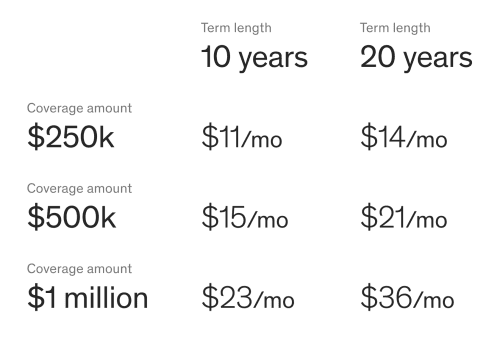Interested in life insurance but don't know where to start?
Find out all you need to know.
/life-insurance-father-and-son.jpg)
If something happens to you, your loved ones don’t just lose you—they also lose your income, on top of everything else you provide. If you provide financial or caregiving support to someone, it’s essential to make sure they would be taken care of if they lost you.
Even if you have employer-sponsored life insurance, you may want to consider additional coverage. Employer-sponsored policies typically offer coverage that is about 1-2X your annual salary. However, financial experts recommend having coverage that is about 10X your salary. Solely relying on your policy through work can result in a large gap in protection.
A life insurance policy can help your family maintain the lifestyle they've grown to love and provide long-lasting financial security.
Think of term life insurance like a subscription. You buy a certain amount of coverage for a set period of time (your term) and pay an insurance company a flat-rate premium every month. This guarantees that your beneficiaries would receive a lump-sum payout (known as the “death benefit”) if you passed away during your term. Term is a simple and straightforward form of life insurance, with more affordable monthly premiums than whole life.
Term life insurance may be right for you if:
- You need to replace your income over a specified period of time (like raising children or paying off a mortgage)
- You need to cover short-term financial responsibilities such as a loan or credit card debt
- You need additional coverage temporarily, such as during child-raising years or starting a business
- You want the most affordable coverage
- You want a more streamlined and straightforward process
Whole life insurance covers you for your whole life as long as you continue to pay your premiums. A payout is guaranteed at the time of death for your policy’s beneficiaries (again, as long as the premiums are paid). Some of the money paid into the policy builds “cash value” which may increase the death benefit or be accessed on a tax-free basis with a policy loan. Due to the duration of the coverage, premiums for whole life insurance are typically more expensive.
Whole life insurance may be right for you if:
- You want coverage for the rest of your life
- You want a policy that builds cash value over time
- You want a policy that can be used for legacy planning or to help cover your final expenses
- You’re willing to pay a higher premium for the unique benefits of this coverage
Your life insurance needs are dependent on your personal and financial circumstances. With that said, there are some general guidelines you can follow.
The first is simple—you can get a rough estimate of your coverage needs by multiplying your current income by 10.
You can also use the DIME formula for a more in-depth breakdown. Add up the four areas below to get a better idea of your needs.
- Debt: The total of your current debts (excluding your mortgage) plus your estimated final expenses
- Income: Multiply your current income by the number of years that you estimate your family would need support
- Mortgage: The amount left on your mortgage
- Education: An estimate of the costs of sending your kids to school and college
You’ll also have to evaluate how long you want coverage for. If you’re looking for coverage for the duration of your life that doesn’t expire, permanent life insurance might be your best bet.
If you want coverage over a specific time period, especially a financially demanding one, term life insurance is a good choice. You may want a term that lasts until:
- Your mortgage is paid off
- Your children are through school
- You retire
- You reach your savings goals
Prices are determined on an individual basis and can vary based on several factors. We’ll dive into some of the main ones below:
- What type of policy you choose: Generally, term life insurance is more affordable than whole life due to the fixed amount of coverage and the lack of cash value accumulation.
- Your coverage amount and length: Less coverage and shorter term lengths tend to cost less–that’s another reason whole life policies cost more, they never expire.
- Your age: Younger people typically have lower rates.
- Your health status: Healthier people typically have lower rates.
- Your lifestyle: People with risky hobbies, like skydiving, typically have higher rates.
- Your tobacco use: Non-smokers typically have lower rates.

Our team of licensed agents is happy to help you with any questions you may have. We’re dedicated to finding the right coverage to protect your loved ones.
/Stocksy_txpa879b228HqU200_Medium_2635086_pb1qsk.jpg)